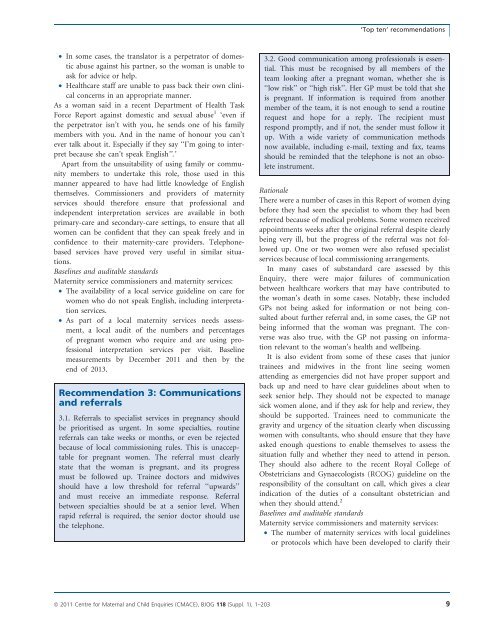6.-March-2011-Saving-Mothers-Lives-reviewing-maternal-deaths-to-make-motherhood-safer-2006-2008
6.-March-2011-Saving-Mothers-Lives-reviewing-maternal-deaths-to-make-motherhood-safer-2006-2008
6.-March-2011-Saving-Mothers-Lives-reviewing-maternal-deaths-to-make-motherhood-safer-2006-2008
Create successful ePaper yourself
Turn your PDF publications into a flip-book with our unique Google optimized e-Paper software.
‘Top ten’ recommendations• In some cases, the transla<strong>to</strong>r is a perpetra<strong>to</strong>r of domesticabuse against his partner, so the woman is unable <strong>to</strong>ask for advice or help.• Healthcare staff are unable <strong>to</strong> pass back their own clinicalconcerns in an appropriate manner.As a woman said in a recent Department of Health TaskForce Report against domestic and sexual abuse 1 ‘even ifthe perpetra<strong>to</strong>r isn’t with you, he sends one of his familymembers with you. And in the name of honour you can’tever talk about it. Especially if they say ‘‘I’m going <strong>to</strong> interpretbecause she can’t speak English’’.’Apart from the unsuitability of using family or communitymembers <strong>to</strong> undertake this role, those used in thismanner appeared <strong>to</strong> have had little knowledge of Englishthemselves. Commissioners and providers of maternityservices should therefore ensure that professional andindependent interpretation services are available in bothprimary-care and secondary-care settings, <strong>to</strong> ensure that allwomen can be confident that they can speak freely and inconfidence <strong>to</strong> their maternity-care providers. Telephonebasedservices have proved very useful in similar situations.Baselines and auditable standardsMaternity service commissioners and maternity services:• The availability of a local service guideline on care forwomen who do not speak English, including interpretationservices.• As part of a local maternity services needs assessment,a local audit of the numbers and percentagesof pregnant women who require and are using professionalinterpretation services per visit. Baselinemeasurements by December <strong>2011</strong> and then by theend of 2013.Recommendation 3: Communicationsand referrals3.1. Referrals <strong>to</strong> specialist services in pregnancy shouldbe prioritised as urgent. In some specialties, routinereferrals can take weeks or months, or even be rejectedbecause of local commissioning rules. This is unacceptablefor pregnant women. The referral must clearlystate that the woman is pregnant, and its progressmust be followed up. Trainee doc<strong>to</strong>rs and midwivesshould have a low threshold for referral ‘‘upwards’’and must receive an immediate response. Referralbetween specialties should be at a senior level. Whenrapid referral is required, the senior doc<strong>to</strong>r should usethe telephone.3.2. Good communication among professionals is essential.This must be recognised by all members of theteam looking after a pregnant woman, whether she is‘‘low risk’’ or ‘‘high risk’’. Her GP must be <strong>to</strong>ld that sheis pregnant. If information is required from anothermember of the team, it is not enough <strong>to</strong> send a routinerequest and hope for a reply. The recipient mustrespond promptly, and if not, the sender must follow itup. With a wide variety of communication methodsnow available, including e-mail, texting and fax, teamsshould be reminded that the telephone is not an obsoleteinstrument.RationaleThere were a number of cases in this Report of women dyingbefore they had seen the specialist <strong>to</strong> whom they had beenreferred because of medical problems. Some women receivedappointments weeks after the original referral despite clearlybeing very ill, but the progress of the referral was not followedup. One or two women were also refused specialistservices because of local commissioning arrangements.In many cases of substandard care assessed by thisEnquiry, there were major failures of communicationbetween healthcare workers that may have contributed <strong>to</strong>the woman’s death in some cases. Notably, these includedGPs not being asked for information or not being consultedabout further referral and, in some cases, the GP notbeing informed that the woman was pregnant. The conversewas also true, with the GP not passing on informationrelevant <strong>to</strong> the woman’s health and wellbeing.It is also evident from some of these cases that juniortrainees and midwives in the front line seeing womenattending as emergencies did not have proper support andback up and need <strong>to</strong> have clear guidelines about when <strong>to</strong>seek senior help. They should not be expected <strong>to</strong> managesick women alone, and if they ask for help and review, theyshould be supported. Trainees need <strong>to</strong> communicate thegravity and urgency of the situation clearly when discussingwomen with consultants, who should ensure that they haveasked enough questions <strong>to</strong> enable themselves <strong>to</strong> assess thesituation fully and whether they need <strong>to</strong> attend in person.They should also adhere <strong>to</strong> the recent Royal College ofObstetricians and Gynaecologists (RCOG) guideline on theresponsibility of the consultant on call, which gives a clearindication of the duties of a consultant obstetrician andwhen they should attend. 2Baselines and auditable standardsMaternity service commissioners and maternity services:• The number of maternity services with local guidelinesor pro<strong>to</strong>cols which have been developed <strong>to</strong> clarify theirª <strong>2011</strong> Centre for Maternal and Child Enquiries (CMACE), BJOG 118 (Suppl. 1), 1–203 9


